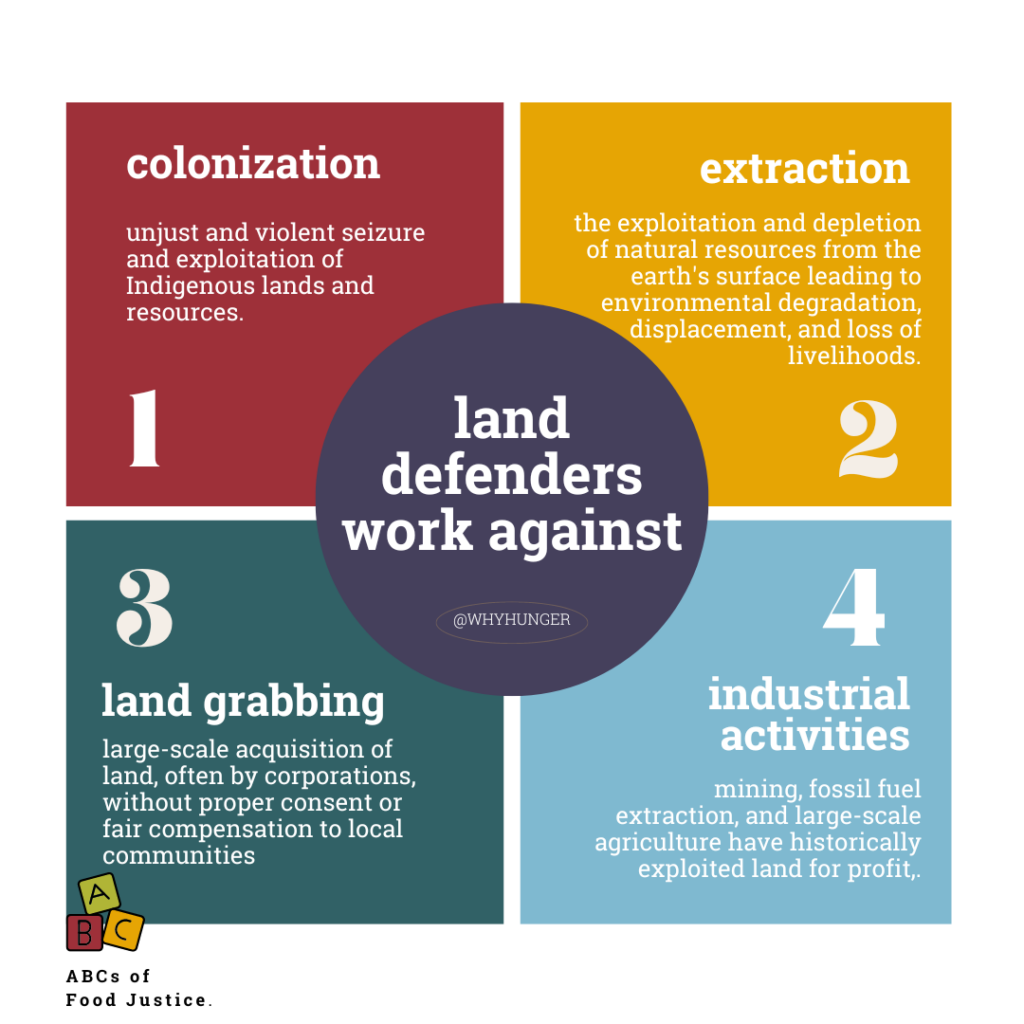L is for Land defenders
At WhyHunger, we know that land and the people that own, farm, and work it, are at the center of the movement towards food sovereignty. Land rights are what drive a community to control their own food systems and protect themselves against environmental degradation, industrial development, resource extraction, and community encroachment.
Globally, the land holds painful stories of Indigenous erasure, encroachment, and extraction. This is often marked by the relentless pursuit of commodified natural resources, economic expansion and is usually at the expense of rural and Indigenous communities around the world. Industrial activities such as mining, fossil fuel extraction, and large-scale agriculture have historically exploited land for profit, leading to widespread pollution, habitat destruction, and social injustice. Because of this, many land defense movements are spearheaded by Indigenous people around the world. Land defenders actively work to protect their lands, territories, and natural resources from harm, exploitation, environmental degradation, displacement, violence, and cultural loss. This is driven by a deep spiritual and cultural connection to the land, as it is viewed as kin and not as a resource. This means that the land is not merely something to be exploited, but is a living entity imbued with sacredness, stories and ancestral ties.
Land defenders also seek to assert their rights and sovereignty over lands that have often been subject to historical injustices, such as colonization, displacement, and dispossession. By defending their land, they resist ongoing efforts by governments, corporations, and other external interests to exploit Indigenous territories for profit or development, reclaiming agency and autonomy over their own resources and territories. And oftentimes these actions come with terrible violence, and even death. Over the last decade, Global Witness reported that nearly 2,000 land and environment defenders worldwide have been killed, with a particularly alarming trend in 2022, where a defender was killed every other day. Indigenous peoples, who make up only about 5 percent of the global population, bore the brunt of these attacks, representing nearly 34 percent of all fatal accidents.
Safeguarding agricultural land from threats, land defenders work to protect against industrial development and corporate land grabbing. In many parts of the world, fertile farmland is increasingly being targeted for non-agricultural purposes, leading to the displacement of small-scale farmers and undermining local food security. By resisting land grabbing and advocating for land rights, communities are working to ensure that land remains available for sustainable food production that meets local needs.
Land defenders play a crucial role in safeguarding biodiversity, ecosystems, and environmental health. Their stewardship practices, rooted in traditional ecological knowledge and traditional land management techniques, contribute to the preservation of biodiversity and the mitigation of climate change impacts. By protecting their lands from destructive industrial activities, they uphold principles of environmental conservation and ecological resilience for the benefit of present and future generations.
Land is at the center of it all, and land defense is intricately linked to sovereignty.
To achieve true sovereignty we must work to reclaim ancestral lands, secure land tenure rights for small-scale farmers and Indigenous communities, and resist the privatization of common resources essential for food production, such as water and seeds. By asserting community control over land, Land defenders uphold the principles of food sovereignty, ensuring that decisions about land use and resource management are made democratically and in the best interests of local communities.
It goes without saying that the struggle for land intersects with wider movements for decolonization, self-determination, and food justice. Through their organizing and resistance, Land defenders challenge systems of power and oppression, and create a more just and equitable world where communities can exercise their rights to land, culture, and self-determination. By defending the land and resources necessary for sustainable food production, communities can reclaim their sovereignty over food systems, promote ecological resilience, and uphold the rights of future generations to thrive in harmony with the natural world.
WhyHunger partners with movements around the world that are working to protect their land and foster food sovereignty. Please check out the Indigenous Environmental Network to learn more.
1 https://www.motherjones.com/environment/2023/09/indigenous-land-defenders-killed-brazil-amazon-colombia-deforestation/
2 https://www.motherjones.com/environment/2023/09/indigenous-land-defenders-killed-brazil-amazon-colombia-deforestation/




